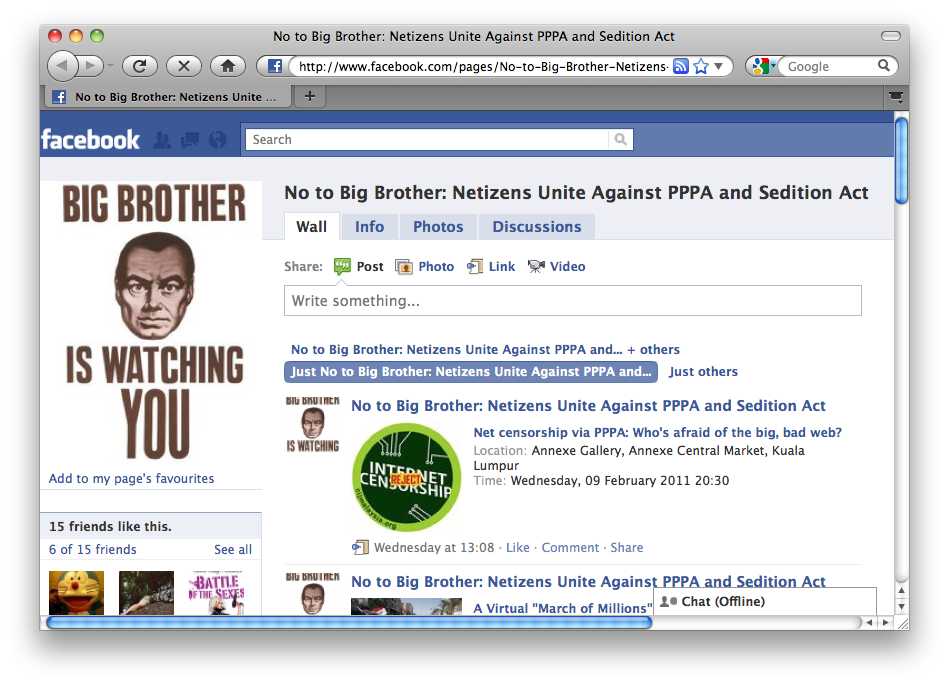The endless distractions on Facebook are the bane of my working life. As a freelance consultant, I need discipline and a strict schedule to meet tight deadlines. But then a friend from university announces his baby is having problems feeding, and so I stop my work to suggest strategies for feeding babies. Or to respond to a Burmese activist’s call for action. Or to look at photos of a cute puppy.
So perhaps licensing the internet under the Printing Presses and Publications Act (PPPA), including social networking sites, might improve our country’s productivity. No more tweets or status updates — just hard work and mugs of teh tarik, like the good old days.
But if this were to happen, what would it mean in practice?
Ridiculously impractical
Under the PPPA, you need a license to publish. Presumably, Facebook would need a licence too, since they are the ones who do the actual publishing. They own the pages, choose the font, layout and privacy settings.
But Facebook is not local. The pages are published in the United States and on various other servers across the world, and then “reprinted” on computers across the world. So the licence to publish is beyond Malaysia’s jurisdiction.
It then becomes a matter of a printing license. Under the PPPA, you need a licence to own and operate a printing press. The equivalent in cyberspace is to own and operate a computer. But how realistic would it be to licence every single computer? It might make matters marginally simpler by licensing modems rather than computers.
Either way, this is going to involve an investment larger than the RM67 billion announced under the Economic Transformation Plan. The number of computers or even just connections in Malaysia today is staggering. Think of just how many computers bureaucrats would be busy regulating as each plane lands or as each bus crosses the border. In the house I’m in right now, there’s one modem and four computers, of which at least two have internal modems. There are at least four internet-capable mobile phones. That’s a minimum of seven licenses right there. On top of that, we have people visiting from abroad. With an iPad and at least one internet-capable mobile phone. Would they need licenses as well?
Then there’s the issue of what counts as a “publication”. Would one licence per computer suffice, or would you need one for each site you published? Or would you only need one license to publish on a regular basis, like magazines and newspapers?
Over-stretching the law
Clearly, practicality seems to be far from the minds of those suggesting that the PPPA include the internet. Not only would each internet connection need a license, possibly each “author” using an online publishing tool would need a license, too.

This would require remarkable re-interpretations of the law. Would a Facebook page, a Twitter account, or a blog count as regular publication, akin to newspapers or magazines? Will the license specify regularity of publication, language used, and geographic area in which it can be circulated? What happens if the terms are violated? Say my tweet is illegally read by someone in Perak, when I only have a license to operate in KL? Who will monitor these violations?
And getting a license under the PPPA is not a simple matter. Under the current Act, it can take six months to six years (or more!) for just a single license. Presumably, for an online version, the process might be less bureaucratic…but by how much? If the process is made lenient to the degree that implementing the proposed amendments would not require a hefty investment, then why would the government bother?
Reverse effect
It would seem that the process of licensing, of applying for licenses, and of monitoring compliance with the terms and conditions, would outweigh any of the productivity gains that Malaysian businesses might make. If the proposed amendments are about monitoring the internet, they’ve made it clear that they’re already doing that.

So there seems to be only one reason why the government would even suggest such a measure. They want people to familiarise themselves with the Act, to understand the rigours and hurdles that all our newspapers have to suffer for that precious piece of paper, the PPPA permit. Mind you, a permit that can be revoked at any time, without legal challenge or recourse.
Is this supposed to make us value our newspapers themselves? I think not. Rather, it will only make us rail against the challenge that the PPPA poses to freedom of expression — and to make us fight all the harder for the constitutional guarantee of freedom of expression guaranteed under Article 10 of the Federal Constitution. ![]()
Sonia Randhawa is a director of the Centre for Independent Journalism, and author of Instant Expert: The Malaysian Media, a guide to media legislation.
[related-posts]


Reza says
Yet another of countless examples of how our civil servants and politicians never think things through when forming policies. Prediction: the policy will be retracted once they realize how ridiculous it is, after everyone else has.
Jonathan says
The extension of the PPPA was never about increasing the sales of newspapers or to educate the people about the difficulties faced by the dailies. It is an outright attempt by politicians to eradicate freedom of expression and a means for them to cling on to power.
If you have done no wrong, there nothing to fear and no need to regulate press or even online content.
The rakyat is not stupid. We know what all this is for.
Dr Syed Alwi says
Dear TNG,
I support the move to monitor the Web. Some form of order is needed in this anarchical beast. For example, deviant teachings i.e. agama sesat – should not be allowed to propagate via the Web. And if a police report is made against a web-site that peddles agama sesat – then it should be investigated.
Regards
Dr Syed Alwi
semuanya OK kot says
Many dinosaurs live on in the 21st century. They are either wallowing in fear and confusion, or are selling them to others. This atavism is a serious danger to the rest of us, as it hampers us in tackling real, major and urgent challenges.
AliasDO says
The people in the govt suggesting these things NEVER EVER think… that’s why the whole country is so screwed up — from the dismal public transport system to the teaching of the English language to the failed Quit Smoking Campaigns, nothing is properly thoroughly thought over.
But thinking of how much money they can kebas got laa…
Politicokat says
This is Malaysia’s attempt to make all its netizens and police more tech-savvy on the cheap. Nothing improves abilities than arms races. The government will attempt to ban, and Malaysia’s netizens will react and learn more leet skills.
Eventually, we will have a nation with an amazing cyber police force and citizens that know their way around servers and cyber security.
It would be great. And yes, due to a certain number of lazy Malaysians, readership of Malaysian newspapers will stop declining.